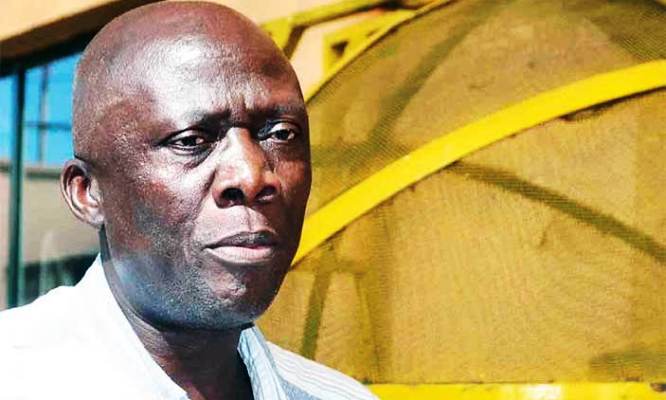Editor
Oman, a dead end for Ugandan maids

Binoga Moses Commissioner Anti-Human Trafficking Police Task Force
On Tuesday this week, Uganda joined the rest of the world to observe the World Day against trafficking of persons.
This day was proclaimed by the United Nations General Assembly in 2013 with the main aim of raising awareness about the plight of victims of human trafficking, for the promotion and protection of their rights’.
Despite the increased global attention created about the vice of human trafficking, many people especially women and children including from Uganda, continue to fall victim of the crimes relating to human trafficking.
For Uganda, majority of the victims of human trafficking have ended up in the Arab country called Oman. Oman’s rise to infamy as the top destination of trafficked girls, sources familiar with the problem, stems from the a number of factors, ranging from the ease with which Oman’s entry visas can be obtained, the absence of formal mechanisms or agreements between the Arab nation and Uganda to monitor workers while there, as well as the presence of vibrant slave market.
During a recent news conference by Andrew Kameraho, the Chairperson of Uganda Association of External Labour Recruitment Agencies, (UAERA) about 50,000 Ugandans were believed to be living and working in Oman by 2019.
Ugandan authorities have categorically stated that Oman remains a risky place to work in especially for girls.
A recent report by UAERA indicates that between 2016 and 2017, when the government imposed a ban a on export of domestic workers, some 30,000 Ugandans were trafficked to Oman and other middle-east destinations.
The UAERA report also added that Oman is not an authorised destination for Ugandan female workers and female professionals.
Like many Arab countries, housemaids in Oman are on high demand. The country’s burgeoning economy has enriched many Omani nationals, and made them able to employ an extra person as a domestic help. The country’s slow population growth rate has meant that it needs more foreigners to fill the man power gap. For instance Oman’s foreign worker force is almost half the country’s 4.4 million.
Uganda’s Ministry of Labour says that it is in the process of negotiating an MOU with the government of Oman.
The 2015 Human Rights Watch report titled: Abuse and Exploitation of Domestic Workers in Oman’ indicates that the number of foreigners in Oman could be higher than 2 million because the report does not include undocumented domestic workers.
The HRW study also showed that, Oman’s domestic workers are mostly recruited from the Philippines, Indonesia, India, Bangladesh, Sri Lanka, Nepal, Ethiopia, and East African countries.
Oman the centre of suffering for maids

Rothna
In her article titled “Respect the Rights of Domestic Workers that Oman Depends On’, that was published in January 2018, in the Oman Centre for Human Rights, Rothna Begum Senior Researcher at the Human Rights Watch, says that all the fifty women who worked as domestic workers in Oman or United Arab Emirates that she spoke to had been mistreated.
“Almost all of them said their employers and agents confiscated their passports. Most worked 15 to 21 hours a day without rest. More than half said they were paid less than promised or not at all. Many said their employers gave them little food, scraps left over from family meals, or starved them as punishment,” she says
She adds that nineteen (19) women were sexually abused through rape by male family members, exposed themselves, and chased them around the house and forced sex.
Begum further noted that some workers who managed to flee the abuses were not only denied help by police but also were arrested and charged for violating the Kafala system, and thus returned them to their employers.
Kafala (visa-sponsorship) system is where all migrant workers in Oman depend on their employers to enter, live, and work legally in Oman as they act as their visa sponsors.
The 2015 HRW report indicated that in spite of Oman’s ban of forced labor, trafficking, and slavery, cases in the study showed that forced labor, slavery and trafficking had continued to take place due to reliance on the infamous Kafala system.
The study further revealed that the legal framework does not address these abuses in accordance with international standards and Oman excludes domestic workers from the protections of its labor laws.
The International Labour Organization (ILO), United Nations human rights experts and bodies have called on Oman, to end the Kafala system and grant domestic workers full labor law protections.
Under the International Human Rights and Labor Treaties, Oman is obliged to address and remedy abuses faced by migrant domestic workers.
Trends of Oman’s fight against human trafficking
To curb these infractions, in November 2006, the Ministry of Man Power of Oman issued a 2/2006 circular which prohibits employers from withholding migrant workers passports but did not specify penalties which increased more passport confiscation.
Compared to 2016 where the Oman government received 3321 passport retention, the 4500 cases were received in 2017.
In 2008, the government of Oman introduced the 2008 Anti-Trafficking law which criminalized sex and Labor Trafficking, with punishments ranging from three to seven years imprisonment or payment between Oman rial 5,000 and 100,000 ($12,990-$259,740) for offenses involving adult victims and seven to 15 years imprisonment and a minimum fine of 10,000 Omani rial ($25,970) for offenses involving child victims..
Despite the blatant and widespread violations and abuses, the government of Oman has shown less willingness to curb the vices.
A 2018 United States State Department (Foreign Ministry) report placed Oman in tier (2) where the government does not fully meet the minimum standards for the elimination of trafficking.
The same report shows that the Oman government investigated just nine alleged human trafficking cases, six sex and three labour trafficking compared one sex and one forced labour in 2017. These figures pale in view of the many cases cited by many human rights observers’ reports.
In a bid to counter the negative publicity arising from its Kafala system, the Oman government allocated some money towards implementing the 2018-2022 National Action Plan against human trafficking. Among the measures some USD 498,340 was set aside to create a permanent shelter for victims of trafficking. The centre can allegedly accommodate up to 50 women and child victims of forced labor, sex trafficking, or other types of abuses.
Why Ugandan maids shall continue to suffer in Oman
Mwiza Mariam, one of the Ugandans involved in advocacy against human trafficking, the beneficiaries of the shelter are nationals whose governments have formal ties with the Omani government, and not Uganda.
“Uganda right now does not have a bilateral agreement with Oman therefore whoever suffers from there is left on their own,” said Mwiza.
She adds that the loopholes in Oman’s labor laws does not adequately cover domestic workers.
Moses Binoga, the Commissioner Anti-Human Trafficking Police Task force told The Sunrise that currently it is very difficult to end human trafficking due to the presence of traffickers and ignorant youth who are easily driven into the vice.
He added that currently, Uganda does not have a victim protection policy which leaves the tortured victims hanging in Oman. “As to what we are doing, we would like to build structures and systems which can be able to identify, protect and help the victims who are being trafficked and punishing the suspects” he added
Our powers end inside Uganda – Internal Affairs Ministry speak up
Jacob Siminyu the Public Relations Officer of the Ministry of Internal Affairs said that as the Ministry, they can do very little to stop the suffering of Ugandans in Oman since they do not have powers to enforce observance of human rights in the Arab country.
“Our role is to train and sensitize stakeholders about the dangers of human trafficking” he said adding: “We detect those who are being trafficked and confiscate their passports and also counsel them but whoever succeeds in sneaking out illegally, we are not responsible for him/her because our jurisdiction ends within Uganda,” he said.
There appears to be some successes arising from the ongoing public awareness drives being made by the relevant government bodies. For example, in Wakiso district,, the LC 1 chairperson of Kitende village Yusuf Kaddu, has been making regular announcements on community radio stations warning parents against sending their girls to Oman. He Has also tried to engage individual residents whom their colleagues cited in the human trafficking racket.
What should be done?
At Lwakhakha on the border between Uganda and Kenya the biggest transit point for trafficked girls, residents say that the solution is to construct a long fence that separates Uganda and Kenya to prevent people from easily crossing as the case is today.
Local leaders in the area have also told The Sunrise that the government needs to increase community sensitization by educating the public about the dangers of human trafficking.
“For example in my village it was until when people heard of the death of one Christine Nambereke that when they realized the dangers of human trafficking” one local leader said
The government on the other hand, continues to insist that Ugandans must use registered and certified labour recruitment agencies because they are governed by specific laws.
Currently, some 140 labour recruitment agencies must present a financial guarantee of some UGX50,000 as an insurance from which the government can draw money to compensate victims of such abuses.
But for Mwiza, the Executive Director of Overseas Worker’s Voice Uganda, the only solution to human trafficking is patriotism.
“Nothing shall change unless we all become patriotic. For example at the border, the deployed security personnel should work tirelessly to ensure that the border is well protected and they should not accept bribes to let out people,”she said.
What government is doing to curb the vice
Hajat Janat Mukwaya, the Minister of Gender Labour and Social Development said that after realizing that traffickers use short period of time to process passports and other travel documents, the government is now working hand in hand with the Internal Affairs Ministry to reduce, the period for processing the documents to ease work for registered companies.
She added that since traffickers always charge little or no fee from the victims compared to the registered companies, the Memorandum of Understanding (MOU) that was signed between Uganda and United Arab Emirates demands that the employer meets all costs and this will also save the girls from being trafficked by conmen.
Comments


























